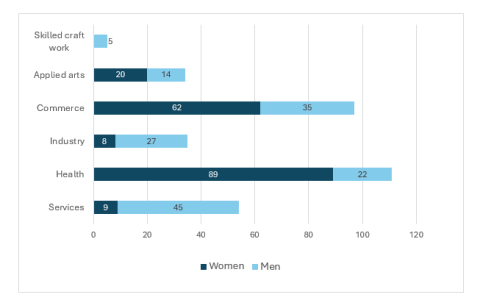Address
Unité nationale d'Eurydice
ANEFORE ASBL
eduPôle Walferdange
Bâtiment 03 - étage 01
Route de Diekirch
L-7220 Walferdange
Tel: +352 247 85289
E-Mail:info@anefore.lu
Website: www.anefore.lu
In Luxembourg, secondary schools and higher education institutions may provide short-cycle programmes leading to an advanced vocational training certificate (BTS; brevet de technicien supérieur).
An advanced vocational training certificate is a vocational qualification certifying that its holder is able to work as a higher technician in a given study field and is capable of mobilising, adjusting and improving his/her competences throughout life.
BTS programmes are based on a dual system: students attend courses held in secondary schools while completing an internship in a company. In general, students have to acquire between 120 and 180 ECTS credits.
Branches of study
38 BTS programmes are currently provided in the study branches of health, commerce, industry, 'applied arts' (arts, manufacturing, construction and design), skilled craft work and services (list of programmes). The standard study duration is between two and three years.
Admission requirements
In order to be admitted to a BTS programme, students have to hold a secondary school leaving diploma (diplôme de fin d’études secondaires), a technician’s diploma (diplôme de technicien) or a foreign diploma recognised as equivalent. Access can also be granted for candidates who can justify, through a validation of acquired experience (VAE), all or part of the knowledge and skills required to obtain a BTS in their field. Some BTS qualifications are not yet accessible through VAE.
Institutions may define additional criteria corresponding to the objectives and the content of the programme, e.g. diplomas from specific branch of study; preliminary observation periods or minimum marks to be achieved in certain subjects (for more details on admission requirements, consult the programme brochure).
If there are more candidates than places, the students' selection may be based either on an entry examination or on a ranking of applications.
Curriculum
Programmes are established by the secondary school and the professional sector(s) concerned. On the proposal of the headmaster, the minister of Research and Higher education appoints a training programme coordinator for a period of 24 months. The coordinator ensures the organisation of the training programme and acts as the secretary of the curriculum group (composed of a member of the school management, the coordinator, course teachers and experts from the relevant professional field). The curriculum group is responsible for the preparation and establishment of the training programme (Art. 5bis. of the law of 26 July 2016).
Short-cycle study programmes (BTS) have to be accredited by the minister of Research and Higher education, on proposal of an accreditation committee (Comité d’accréditation pour les formations du brevet de technicien supérieur), composed of six members (half of whom are experts from the Luxembourg economic sectors and half of whom are experts in quality assurance from various European countries).
The committee may deliver either a positive or a negative opinion, or it may propose additional conditions to be respected by the institution.
For each programme, the minister sets the curriculum, the timetable and the terms of evaluation and certification.
The accreditation of the institution remains valid for a period of five years. The provider has to continue organising the cycle until the last students have had the opportunity to obtain a diploma.
Teaching methods
As regards teaching methods, BTS programmes have to ensure the following elements:
- A dual apprenticeship system, that is internship in a company and theoretical courses at the secondary school (either class-led instruction or practical work)
- Continuing tutoring of the students (Art. 26duodecies de la loi du 23 juillet 2016).
Furthermore, each study programme defines organisational elements, such as bibliographies and evaluation methods. Didactical elements, such as teaching methods, are to be chosen by the teachers.
Progression of students
Programmes are organised in modules, which are subdivided into courses. Students have to obtain a mark of at least 10 of 20 for each module of their programme. Positive marks remain valid for five years.
Employability
The concept as well as the practice of BTS programmes is oriented towards the students' employability and their acquisition of labour-market relevant skills. This objective is achieved by means of:
- The representation of the specific sector in the accreditation commission
- A mandatory internship for BTS students
- The engagement of teachers working in the professional sector concerned.
Student assessment
During each course, students’ aptitudes, competences and knowledge are assessed either by continuing evaluation or by a final examination, or both. Evaluation methods are defined within the study programmes.
Students have to obtain a mark of at least 10 from a total 20 for each module of their programme.
Certification
The chart below illustrates the total number of BTS degrees by field for the academic year 2022/2023:

(Source: Key figures for higher education 2022/2023, p.31)
BTS diplomas are awarded on the basis of a deliberation of a jury, composed by a government commissioner (commissaire de government), the school principal, the coordinator and four persons who have held at least one course.
BTS diplomas are automatically registered in the register of higher education certificates (registre des titres de formation).
Organisational variation
In theory, BTS programmes may be organised by private or public secondary schools and by higher education institution. In practice, all current BTS programmes are organised by secondary schools.
As mandatory internship represents an important aspect of the programme, there are no alternative structures foreseen, such as distance learning.
